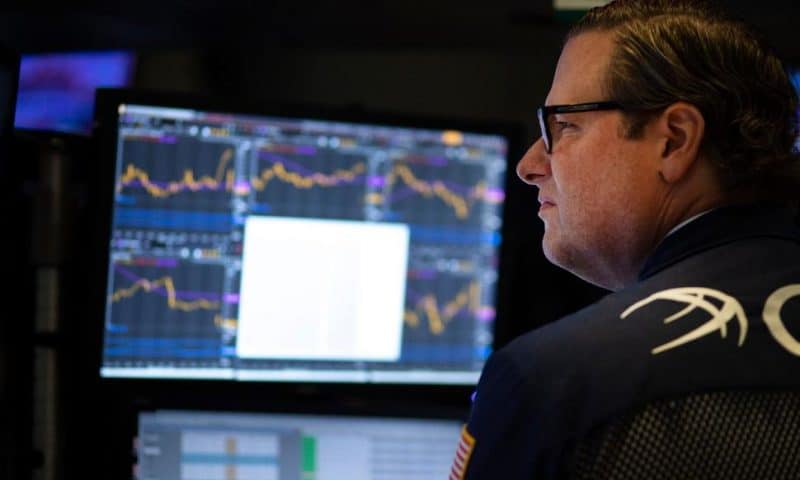U.S. stocks finish broadly higher after Trump indicates a deal to resolve the long-running, costly trade dispute with China could happen soon.
U.S. stocks finished broadly higher Wednesday after President Donald Trump indicated that a deal to resolve the long-running, costly trade dispute with China could happen soon.
Trump’s remarks, in addition to a sharp increase in sales of new U.S. homes, helped reverse an early slide for stocks.
Technology companies led the rally, which snapped a three-day losing streak for the market. Communication services stocks and companies that rely on consumer spending also notched solid gains. Health care stocks were the biggest loser.
The midmorning release of a rough transcript of a July phone call between Trump and Ukraine’s president that is at the center of a congressional impeachment inquiry into Trump didn’t have much of an impact on the market. That suggests traders are largely shrugging off the potential consequences the political drama might have for stocks at least for now.
“If the market really thought it was bad, it would go down and stay down, and it would be the only thing impacting the market,” said Tom Martin, senior portfolio manager at Globalt Investments.
The S&P 500 index rose 18.27 points, or 0.6%, to 2,984.87. The Dow Jones Industrial Average gained 162.94 points, or 0.6%, to 26,970.71.
The Nasdaq climbed 83.76 points, or 1.1%, to 8,077.38. The Russell 2000 index of smaller companies picked up 17.07 points, or 1.1%, to 1,550.65.
The S&P 500, Dow and Nasdaq are on track to end the third quarter with modest gains.
Stocks got off to a downbeat start Wednesday as traders continued to weigh the implications of the House Democrats-led impeachment inquiry into Trump.
The S&P 500’s losses began to ease after the Commerce Department said sales of newly built U.S. homes jumped 7.1% last month as lower interest rates helped drive sales. The report sent homebuilder shares broadly higher. KB Home gained 3%.
Stocks continued to recover after the release of the Trump phone call transcript. The market then climbed into positive territory after Trump, speaking to reporters at the United Nations, said China wants “to make a deal very badly,” adding that “it could happen sooner than you think.”
Trump did not elaborate. Talks between top-level officials aimed at resolving the costly trade war are expected to take place next month.
The broader market was coming off its worst day of the month, when a weak consumer confidence report, more trade war rhetoric and the start of the impeachment inquiry rattled investors.
Some analysts expressed doubts Wednesday that the political drama unfolding in Washington will affect the market significantly.
“Today, while the current crisis will add to equity market instability, we don’t think it will lead to recession or a new bear market,” Sam Stovall, chief investment strategist at CFRA, wrote in a research note.
Ryan Detrick, senior market strategist at LPL Financial, said that as long as the economy remains on firm footing, impeachment-related developments won’t affect the bull market’s run.
Even so, the congressional probe does add a degree of uncertainty to the market and could complicate the White House’s efforts to resolve trade disputes with China and other nations.
“The issue is if impeachment ends up being a negative or a distraction, it might hurt Trump’s hand in negotiating with the EU and with China,” Martin said.
That could further drag out the trade disputes, which have already started to have a negative impact on economies in China, Germany and the U.S.
Chipmakers were among the big winners in the technology sector Wednesday. Nvidia climbed 3.3% and Qualcomm rose 2.7%. Apple, which does a lot of business in China and has much riding on the outcome of the trade war, gained 1.5%.
Citigroup rose 2.2% and Wells Fargo added 1.3% as financial sector stocks rose along with bond yields. The yield on the 10-year Treasury rose to 1.73% from 1.63% late Tuesday, a big move. The higher yields help banks charge more lucrative interest rates on loans.
Communication services stocks also helped lift the market out of its early malaise. Google gained 2.3% and Netflix climbed 4%, recouping some of its losses from earlier in the week.
Boeing rose 1.2% as investors applauded the company’s move to form a new safety committee as it deals with the legal and financial fallout from two deadly crashes. Uniform company Cintas climbed 5.7% after it reported a surprisingly good fiscal first-quarter profit and raised its forecast for profits and revenue.
Nike jumped 4.2% after a stellar earnings report and helped lift consumer-oriented companies. Tobacco company Philip Morris jumped 5.2% after calling off merger discussions with fellow tobacco giant Altria, which slid 0.4%.
Benchmark crude oil fell 80 cents to settle at $56.49 a barrel. Brent crude oil, the international standard, dropped 71 cents to close at $62.39 a barrel. Wholesale gasoline fell 2 cents to $1.63 per gallon. Heating oil declined 2 cents to $1.95 per gallon. Natural gas was unchanged at $2.50 per 1,000 cubic feet.
Gold fell $27.50 to $1,504.60 per ounce, silver fell 56 cents to $17.96 per ounce and copper rose 1 cent to $2.60 per pound.
The dollar rose to 107.81 Japanese yen from 107.05 yen on Tuesday. The euro weakened to $1.0942 from $1.1018.
Major stock indexes in Europe finished broadly lower.

